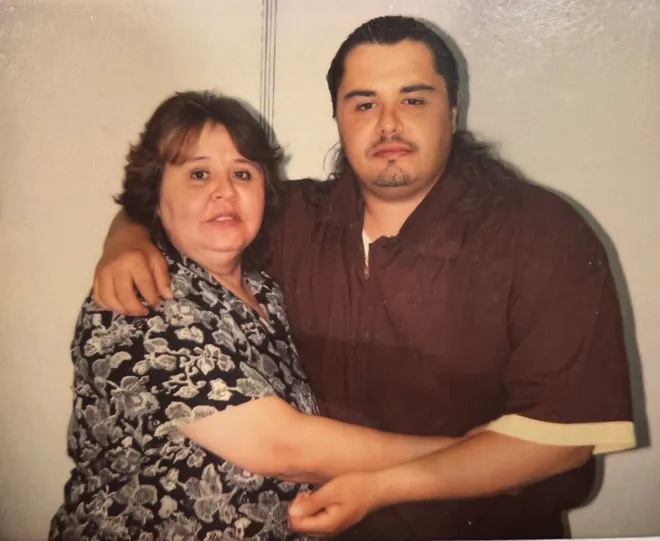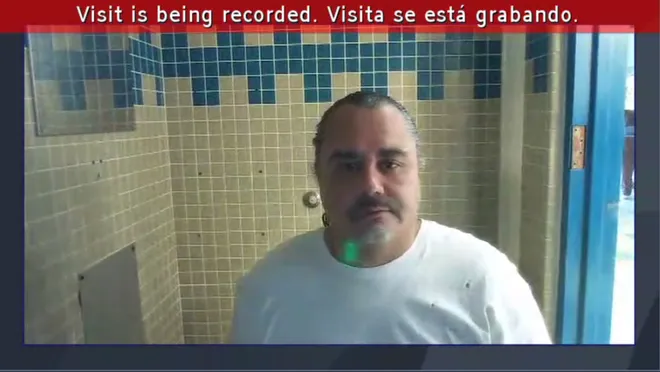His prison sentence was 60-150 years. But Native American Efrain Hidalgo is finally free.

Efrain Hildalgo Jr. sat in front of the television at his sister's house while the rest of his family went out to run some pre-Super Bowl errands. Just relax and watch TV for awhile until we get back, his sister told him.
There was one problem: Hidalgo − a Native American freed Friday from prison after serving one of the longest sentences in Pennsylvania's history − didn't know how to work the TV. So he picked up his nephew's guitar and began to play. When his nephew came in, he asked his uncle whether he wanted to watch something on Netflix.
Hidalgo didn't know what Netflix is.
"Everything is just … it's mind-boggling," he said, pausing for a moment to find the right words. "I had a meltdown later, I cried hard. I feel better now, but it's going to take a lot, adjusting to this new world."
Thought he would die in prison
Hidalgo, who spoke exclusively with USA TODAY after his release after 24 years, used to think he would likely die in custody after being sentenced to 60 to 150 years on drug charges.
The Buffalo man, a U.S. citizen and member of the Mohawk Nation, would have been nearing his 86th birthday before becoming eligible for parole.
Now, instead of staring down the rest of his days behind bars, Hidalgo is enjoying time with his family in Buffalo, looking forward to a Florida getaway and to eventually living with his mother on the Six Nations of the Grand River reserve in Ontario, Canada.
He credits a 2021 USA TODAY investigation into his plight, and the question of judicial prejudice in sentencing of people of color, with helping him secure his release.
"The article opened the door for Mr. Hidalgo to return to court," said Stephanie Noel, lead counsel on his post-conviction relief petition. "We were able to plead, and proved, judicial bias on the part of the sentencing judge based on (the judge's) comments to USA TODAY."
"Our family prayed so long over this," said Hidalgo's cousin Mikayla Richie, who contacted USA TODAY in 2021 about Hidalgo. "We thought it wouldn't happen. But it took the news story to get everything rolling. He never gave up fighting to get out."
The story:Native American man serving 'de facto life sentence' for drug dealing. 'Why must I die in prison?'

A former judge's remarks on crime and people of color
Hidalgo's mother and other family members picked him up on Friday afternoon from a state prison in Pennsylvania, where he was convicted and sentenced by Norman Callan, a Blair County Common Pleas Court judge. Another judge, the Altoona Mirror reported, imposed a new sentence last week, giving Hidalgo credit for the 24 years he'd already served.
Callan, who was in private practice by 2021 when he spoke to USA TODAY about Hidalgo's case, rejected his attorneys' arguments about the lengthy prison term, including the disproportionately harsh sentencing of Black, Hispanic and Native Americans.
"Whether it's Native American, Hispanic American, African American," Callan said in 2021, raising a discredited theory, "there's a disproportionate number in prison because they do a disproportionate amount of crime."
That comment led Hidalgo and his lawyers to file a petition for post-conviction relief in 2022, according to a story in the Altoona Mirror, accusing Callan of racial bias.
Noel said two professors at Pennsylvania State University, Jeffrey Ulmer and Holly Nguyen, conducted a data analysis showing not only that Callen's assertion about crimes committed by people of color was wrong, but also that sentencing in Blair County was disproportionately harsh for Black, brown and Native people during the period when Hidalgo was sentenced.
"They showed that charging decisions, sentencing and prosecutorial decisions were simply not race neutral," said Noel, a former public defender who's now in private practice.
Callan, reached Monday by USA TODAY, also said the 2021 story led to Hidalgo's release but took issue with the story, saying, "I am not a racist, but that was the inference from the story."
Asked about the specific comment referenced by Hidalgo's lawyers, Callan said it was a perception he developed during his years on the bench.
"But perception and reality are two different things," he said.
Who is Efrain Hidalgo and what did he do?
Efrain Hidalgo was 27 years old when he was sentenced for his role in a heroin ring that brought drugs from Buffalo, New York, to Altoona, Pennsylvania. Prosecutors described him as a "kingpin," but Hidalgo, who had no serious criminal history, maintained that his operation was low-level, dealing small bags of heroin at a $15- to $25 markup.
Typical state sentencing guidelines at the time called for about 10 years; Callan's sentence exceeded what the prosecutor sought. Callan ordered Hidalgo to serve his sentences consecutively, so instead of serving 10 to 20 years, he would be imprisoned for 60 to 150 years. At the time, it was the longest drug-related sentence in Pennsylvania history, a sentence handed down in a deeply conservative area in the center of the commonwealth.
Blair County's population of about 121,000 people is nearly 95% white and 2.4% Black; just 1.5% of its population is Hispanic or Latino and only 0.2% is Native American, according to the U.S. Census.
Native Americans, the Prison Policy Initiative reports, are disproportionately represented in U.S. prisons: They are incarcerated in state and federal prisons at double the national rate and more than four times the rate of white people (763 per 100,000 people for Native Americans, vs. 181 per 100,000 for white people).
Hidalgo filed appeals over the course of his 24 years of incarceration, arguing his court-appointed attorney did not represent him effectively, that his sentence was excessive and that prosecutors withheld evidence. While in prison, he also earned his high school equivalency, learned to paint and play guitar and became an EPA-certified refrigeration technician.
Could Hidalgo's case impact others?
Noel said Hidalgo's case was somewhat unique, in that Callan's remarks to USA TODAY were central to their argument that the judge was biased in sentencing him in 2000.
"He had no prior criminal convictions, and this was a non-violent drug dealing case," she said. "While we don't minimize what he did, the sentence has to not only fit the crime committed, but also the person who committed it. This was disproportionate to the offense, and to Mr. Hidalgo, given his history."
The Pennsylvania Attorney General's Office, Noel said, gave the case "careful and thoughtful consideration," unusual because there is generally "almost a reflective impulse to oppose relief," she said.
'Don't let this be a dream'
Hidalgo described his first few days out of prison as "chaotic," but he's grateful to be back in his family's warm embrace. They've taken him shopping for new clothes and shoes, his nephew teasing him that his looks are "from the '90s" and offering to buy him sneakers more in keeping with current fashion.
"All these skinny clothes," he said. "I'm a big man. They want to buy me things, but I have some money and I don't want to be a burden on them."
For now, Hidalgo is trying to adjust to his new life, and at age 50, he knows that will take time. He reconnected with his father, and is looking forward to going home to his mother, perhaps opening a restaurant ("I love to cook," he said) and mentoring young people on the reservation so they don't fall into the life he once led.
"Even today, I still feel this is all a dream," he said. "Like maybe I slipped and hit my head and I'm just in a coma or something. I know it sounds crazy, but I keep thinking, please don't let this be a dream ... It's all so unreal. I can’t explain the feeling inside me."

Disclaimer: The copyright of this article belongs to the original author. Reposting this article is solely for the purpose of information dissemination and does not constitute any investment advice. If there is any infringement, please contact us immediately. We will make corrections or deletions as necessary. Thank you.






